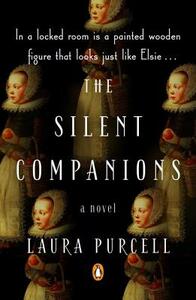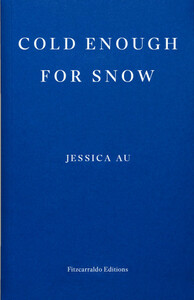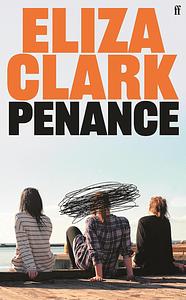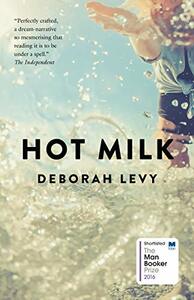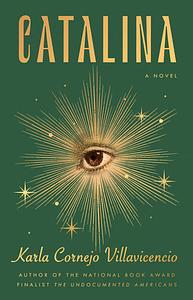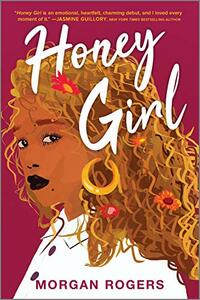You need to sign in or sign up before continuing.
Take a photo of a barcode or cover
notesofacrocodile's Reviews (254)
dark
mysterious
tense
this book embodies one of my most favourite styles of writing: evocative, descriptive, and atmospheric. there's a certain layered quality required in the writing of gothic horror/terror in order to give it a haunting lyricism in plot and form, and laura purcell's writing—in my opinion—has that quality.
a couple of loose ends are involved as would be expected in some gothic horror novels but that makes discussions surrounding them all the more immersive!
a couple of loose ends are involved as would be expected in some gothic horror novels but that makes discussions surrounding them all the more immersive!
It struck me that the last time I had been here, I was with Laurie, and thinking on and off about my mother. And now, I was here with her, thinking on and off about him, about how we had rushed around the city from morning to long after dark, seeing everything, taking in everything. During that trip, it was like we were children again, mad and excitable, endlessly talking, endlessly laughing, always hungry for more. I remembered thinking that I had wanted to share some of this with my mother, even if just a small amount.
this novella felt like a dream, a dream that is gently melancholic and softly blue, with an autumnal caress.
a mother and a daughter in japan, visiting galleries, museums, and travelling by trains, while they attempt to catch up with each other. the daughter's mind flickers towards the past: an uncle caught in the current of adolescent love, her sister's account of childhood, adulthood, and love, her experiences with a charismatic professor with an impressive house, and so on. the intriguing thing about this novella is how everything feels ghostly, even the mother and the daughter themselves. it feels as though when one reaches out is when the other has just looked away, and when the other realised it and reaches out is when the former has just looked away, and the game continues like that (if that makes sense). as the novella progressed i began to visualise the characters more and more like ghostly wisps in the shapes of a mother and daughter, and the writing slowly feeds into this perception as well.
there is a deeply contemplative quality to this novella, which forces the reader to slow down and take it in. i took about 5 days to finish reading this one, both because i was busy and also because i did not want to rush myself with this at all. i look forward to reading more from this author!
challenging
dark
tense
The crime itself, however, will live on. It will live on for as long as podcasts which covered it are available. It will live on for as long as this book is in print. A Murderpedia page with a complete list of Joni’s injuries is available to view, bordered with ads for ‘BEST EVER 18+ ONLY online games’ and the latest superhero franchise movie. It will live on in the chumbox ads that first led me to this crime. It will live on in the memories of everyone who comes to Crow – and everyone who sees Joni’s sun-bleached memorial.
a deeply absorbing, yet unsettling novel from eliza clark that is modelled on the public coverage and perception of true crime, with a focus on the harrowing torture and murder of a teenage girl at the hands of her own peers. clark does not hesitate to get into the nitty-gritty of the 'true crime industrial complex', accentuated with astutely observed replications of the 2010s tumblr landscape and the complexities of friendships amongst adolescent girls in all of its anger, rage, hurt, concern, and jealousy. the dehumanisingly voyeuristic gaze upon murders such as the one in question is critically highlighted, as well as the questionable 'fandoms' that emerge in its wake, and the depravity of the culture of commercialisation and sensationalisation that engulfs even the most personal and tragic of losses. clark has clearly done her research well, tapping into real-life instances of murders and murderers (and those who cover them for the media) to craft a story that is all the more terrifying by the sheer fact that it's all very much possible.
my primary qualm about this novel was that it felt bogged down in parts, but was otherwise largely effective in its message and plotline. i am glad i gave the author a second chance after not liking her debut novel boy parts, because this one was so much better in how it expressed its themes, characters, and overall writing style.
reflective
sad
tense
...That was my mother's main expression: slightly resentful, a whiff of resentment, not personally against me (though there was that, of course), but a vague sense of grievance against the world.
'You are always so far away, Sofia.'
I am not far away. I am always too close. To her grievances.
what a curious novel. 20% in and i was more than positive that this book was the sort that was not for me, that it lacked any plot to hold itself together, that it would feel tedious to get through etc. but i was surprised by the effortlessness with which i found myself entangled in the story.
sofia is 25 years old, a deeply-fragmented daughter of her english mother and greek father who separated when she was a young girl. she has abandoned her doctorate in anthropology halfway through in order to care for her mother, who just cannot seem to walk for no explicable reason, although we as readers can assume that it may be of psychosomatic origins. the novel spans their trip to the south of spain, where they hope to find a cure at the private clinic of a renowned doctor.
one of the things that struck me early on was how atmospheric it was; you feel the haze of the heat, the stillness of a slow summer, the pooling of sweat. the writing was lyrical and infused with symbolism and allegory, which is why i think this would also make for a great buddy read. the characters, the subplots, the events, whether major or minor, all held a meaningful weight that makes you pause to think.
sofia's character feels bleary-eyed and barely props itself up against the storyline, constantly tossed around by the narrative and threatening to give way, with most of her agency emerging in the brief moments where her inner anthropologist crops up in her interactions with others. but as the story progresses and she gets bolder, we begin to have new questions: who is sofia? who is she when she is not with or thinking about her mother? who is she when she isn't engulfed by the fog of her own guilt, abandonment, and failures?
her relationship with ingrid, a german woman she meets during her stay is where the writing gets particularly passionate and occasionally rhapsodic. their relationship is fraught with complexity and breathless fervour. ingrid embodies independence and noncomformity, a disruption of the conventionalities of the femininity associated with womanhood—something sofia appears to want to break free from as well. this becomes clearer in the observations sofia makes of ingrid as well as in how she mentally notes the rituals expressed by the relationship dynamics of her father and his second, younger wife.
the central relationship, however, with some of the most tense and heartbreaking instances, was that of sofia and her mother, rose, wracked by codependency. rose embodies the woman that chased love against expectations and tried to play by the rules of this love, only to be bogged down by the patriarchal restrictions placed upon her gender, perpetuated by the leaving of her husband for a younger woman and the distinct sting of being left behind with a young daughter bearing the burden of her father's face. when rose's husband leaves her, she severs ties to what he held personal and beloved: the greek language, christianity, greek food.later on, when her feet betray her, she is ready to literally sever that, too.
there is a lot more i could say about this book, i could go on forever. this story was ultimately a very introspective, quiet, turbulent, fever dream of a book. you read and reread lines, you question the protagonist's reality, and you sit in the silences of the everyday small betrayals that permeate everything.
sofia is 25 years old, a deeply-fragmented daughter of her english mother and greek father who separated when she was a young girl. she has abandoned her doctorate in anthropology halfway through in order to care for her mother, who just cannot seem to walk for no explicable reason, although we as readers can assume that it may be of psychosomatic origins. the novel spans their trip to the south of spain, where they hope to find a cure at the private clinic of a renowned doctor.
one of the things that struck me early on was how atmospheric it was; you feel the haze of the heat, the stillness of a slow summer, the pooling of sweat. the writing was lyrical and infused with symbolism and allegory, which is why i think this would also make for a great buddy read. the characters, the subplots, the events, whether major or minor, all held a meaningful weight that makes you pause to think.
sofia's character feels bleary-eyed and barely props itself up against the storyline, constantly tossed around by the narrative and threatening to give way, with most of her agency emerging in the brief moments where her inner anthropologist crops up in her interactions with others. but as the story progresses and she gets bolder, we begin to have new questions: who is sofia? who is she when she is not with or thinking about her mother? who is she when she isn't engulfed by the fog of her own guilt, abandonment, and failures?
her relationship with ingrid, a german woman she meets during her stay is where the writing gets particularly passionate and occasionally rhapsodic. their relationship is fraught with complexity and breathless fervour. ingrid embodies independence and noncomformity, a disruption of the conventionalities of the femininity associated with womanhood—something sofia appears to want to break free from as well. this becomes clearer in the observations sofia makes of ingrid as well as in how she mentally notes the rituals expressed by the relationship dynamics of her father and his second, younger wife.
the central relationship, however, with some of the most tense and heartbreaking instances, was that of sofia and her mother, rose, wracked by codependency. rose embodies the woman that chased love against expectations and tried to play by the rules of this love, only to be bogged down by the patriarchal restrictions placed upon her gender, perpetuated by the leaving of her husband for a younger woman and the distinct sting of being left behind with a young daughter bearing the burden of her father's face. when rose's husband leaves her, she severs ties to what he held personal and beloved: the greek language, christianity, greek food.
there is a lot more i could say about this book, i could go on forever. this story was ultimately a very introspective, quiet, turbulent, fever dream of a book. you read and reread lines, you question the protagonist's reality, and you sit in the silences of the everyday small betrayals that permeate everything.
challenging
dark
emotional
sad
There's something about the faces of everyone in my family and in mine. I think you can see in our eyes the kind of sadness, which is in two places at once—mourning the past, grieving the future. Sad in a historically significant and visually satisfying way.
catalina, the titular protagonist indulges us in a narrative where she dramatically paints herself with an exhibitionistic flair, detailing her days as a student at harvard university. she casts a trained indifferent eye to the literary societies and the fancy parties, the sophisticated students and the celebrity professors. catalina also happens to be a dreamer: an undocumented immigrant who arrived in the united states of america as a child.
i initially picked this novel up due to its comparisons with the idiot by elif batuman, which happens to be one of my favourite novels. i absolutely adore reading stories centering lonely young women who are discovering themselves and learning to navigate instability and uncertainty, while recording all their thoughts with honesty and the occasional vulnerability. elif batuman's selin offered this perspective, and so did karla cornejo villavicencio's catalina. the novel also notably starts with catalina's remark on the novelty of instagram; reminiscent of selin commenting on the novelty of emails at the beginning of the idiot. i understand where the similarities between the two novels cropped up, but catalina definitely stands by itself, and apart.
catalina operates her narrative with the weighted dimension of being an undocumented ecuadorian immigrant who lives with her overworked grandparents; they firmly vocalise their belief in the necessity of her excelling in her educational pursuits, which she does try to. she is opinionated and seeks a spontaneous thrill to satiate her diet of a life of instability and being denied of what could have been deservedly hers. she would love to appear as though nothing can move her but unfortunately, her inner cataclysmic emotional state is betrayed to us through her narrative. at times her words appear to emerge from a place of bone-deep tiredness, and at other times, through a self that is contorted from feigning a strained nonchalance.
there is a lot that i loved about this novel: i was really interested by catalina as a protagonist and how she observed the world around her, what she had to say. she can be frustrating and nonsensical at times, but within the context, everything makes sense! the writing style also sounded intensely personal at times and when i searched up the author, it made sense when i found out that the author herself is an undocumented immigrant in the u.s. who graduated from harvard in 2011.
the narrative would flow easily at times, one scene into another, one train of thought into another, but sometimes there were abrupt time skips and changes in scene, which i understand some may not necessarily appreciate. much like the idiot, some readers may also feel frustrated about the lack of action in the first two-thirds of the novel, but it is all integral to catalina's story. 4 stars for this one overall!
reflective
an intimate, lonely picture of the writer as a young woman, born into a conservative upper caste family, and seeking for nothing but love and companionship. if you're from kerala, it would be impossible for you to not have heard of kamala das: she was bold, outrageous, and spoke of sensuality with unabashed intimacy and familiarity. more so, she appealed to other women (like her, from a similar caste background) trapped within the confines of gender roles. we see how her emotional ferocity and protectiveness over her identity as a writer remained the most consistent trait she carried with her throughout her life, from a young girl whose work was written off as that of another, to an older, exhausted woman who is ready to give away everything as long as she can write.
the chapters were short and what we got were snapshots from parts of her life, but it was very absorbing and poetic. i had read beforehand that it has been admitted that certain parts of this 'autobiography' were actually fabricated and not real, but a part of me also chooses to believe that they were very much rooted in reality.
since she was from a privileged caste location, i should not have expected it, but i was hoping for some solid critical outlook on her part with regard to caste. nothing overly intellectual, but at least something in order for me to be able to place what kind of boldness and outrageousness she has embodied in the malayalam literature scene. most of her transgressions however, seem to be largely restricted to blunt honesty on the expectations placed upon women of her caste and class. she also tended to view the working class in ways that made her socioeconomic status pretty apparent.
most of my rating goes towards the writing, the excerpts of poetry, and the themes present- it was certainly a rewarding experience.
the chapters were short and what we got were snapshots from parts of her life, but it was very absorbing and poetic. i had read beforehand that it has been admitted that certain parts of this 'autobiography' were actually fabricated and not real, but a part of me also chooses to believe that they were very much rooted in reality.
since she was from a privileged caste location, i should not have expected it, but i was hoping for some solid critical outlook on her part with regard to caste. nothing overly intellectual, but at least something in order for me to be able to place what kind of boldness and outrageousness she has embodied in the malayalam literature scene. most of her transgressions however, seem to be largely restricted to blunt honesty on the expectations placed upon women of her caste and class. she also tended to view the working class in ways that made her socioeconomic status pretty apparent.
most of my rating goes towards the writing, the excerpts of poetry, and the themes present- it was certainly a rewarding experience.
emotional
hopeful
reflective
i maintain that i would have probably loved this book better during the time i was in my y.a. phase.
the overall plot had piqued my interest initially, and i was drawn to the premise of an overworked, perfectionist black lesbian in academia who has to confront her own neurotic tendencies. on this front, the author did deliver, and with so much more: supportive groups of friends, a whimsical wife found with a stroke of pure luck, summers spent in the company of friendly strangers in new york apartments and farmers' markets in florida. but we need to talk about the prose. its extravagance bordered on unnecessary in a lot of moments, which sometimes interrupted the flow of dialogue and scenes in particular contexts. and don't get me wrong, i absolutely love ornamental prose, crafted for readers to relish in the author's finesse in establishing a scene or thought. but there's a time and place and the random uncalled-for purple prose in certain parts stopped the experience of reading this novel from becoming an immersive one, which it otherwise could have been. this was there in many scenes, and in dialogues it was mostly present in how yuki spoke. again, if i were still in my y.a. phase, i may have been able to read this without noticing anything that bothered me too much, but i am not.
i also wish we could have seen more of yuki, especially her background. i wanted to know about her rather than have her there as a sort of manic pixie dream girl with mysterious ways and quirky habits.
on the topic of the writing, i would also say that in the second part of the book, i felt like it toned down to suit the storyline a lot better. and for this part i dedicate most of my rating.
i also loved seeing all her friend groups and the ways in which they supported her and figured into her life. even when she is surrounded with so much love and support, she still feels so lonely, and i think there's a commentary about systemic issues such as capitalism and racism to be found in that.
overall, i still liked this one a lot better than many of the romance books i have read so far.
the overall plot had piqued my interest initially, and i was drawn to the premise of an overworked, perfectionist black lesbian in academia who has to confront her own neurotic tendencies. on this front, the author did deliver, and with so much more: supportive groups of friends, a whimsical wife found with a stroke of pure luck, summers spent in the company of friendly strangers in new york apartments and farmers' markets in florida. but we need to talk about the prose. its extravagance bordered on unnecessary in a lot of moments, which sometimes interrupted the flow of dialogue and scenes in particular contexts. and don't get me wrong, i absolutely love ornamental prose, crafted for readers to relish in the author's finesse in establishing a scene or thought. but there's a time and place and the random uncalled-for purple prose in certain parts stopped the experience of reading this novel from becoming an immersive one, which it otherwise could have been. this was there in many scenes, and in dialogues it was mostly present in how yuki spoke. again, if i were still in my y.a. phase, i may have been able to read this without noticing anything that bothered me too much, but i am not.
i also wish we could have seen more of yuki, especially her background. i wanted to know about her rather than have her there as a sort of manic pixie dream girl with mysterious ways and quirky habits.
on the topic of the writing, i would also say that in the second part of the book, i felt like it toned down to suit the storyline a lot better. and for this part i dedicate most of my rating.
i also loved seeing all her friend groups and the ways in which they supported her and figured into her life. even when she is surrounded with so much love and support, she still feels so lonely, and i think there's a commentary about systemic issues such as capitalism and racism to be found in that.
overall, i still liked this one a lot better than many of the romance books i have read so far.
dark
tense
dark
emotional
sad
tense
what a powerful collection of short stories; the very first opening story ("they eat meat!') and the closing one ('this adivasi will not dance') were my favourites. hansda sowvendra shekhar draws heavily upon the real daily lives of the indigenous santhali people to the point where many of the stories just felt like real-life accounts. with his matter-of-fact style prose, the author explores themes such as the damages of coal mining and mineral exploitation in jharkhand for the adivasi communities there, the lives of women in extremely patriarchal and poverty-ridden lives, santhali middle class lives, and so on. i had a minor gripe with the fact that there was no glossary present, but overall this is a very important piece of literature.
